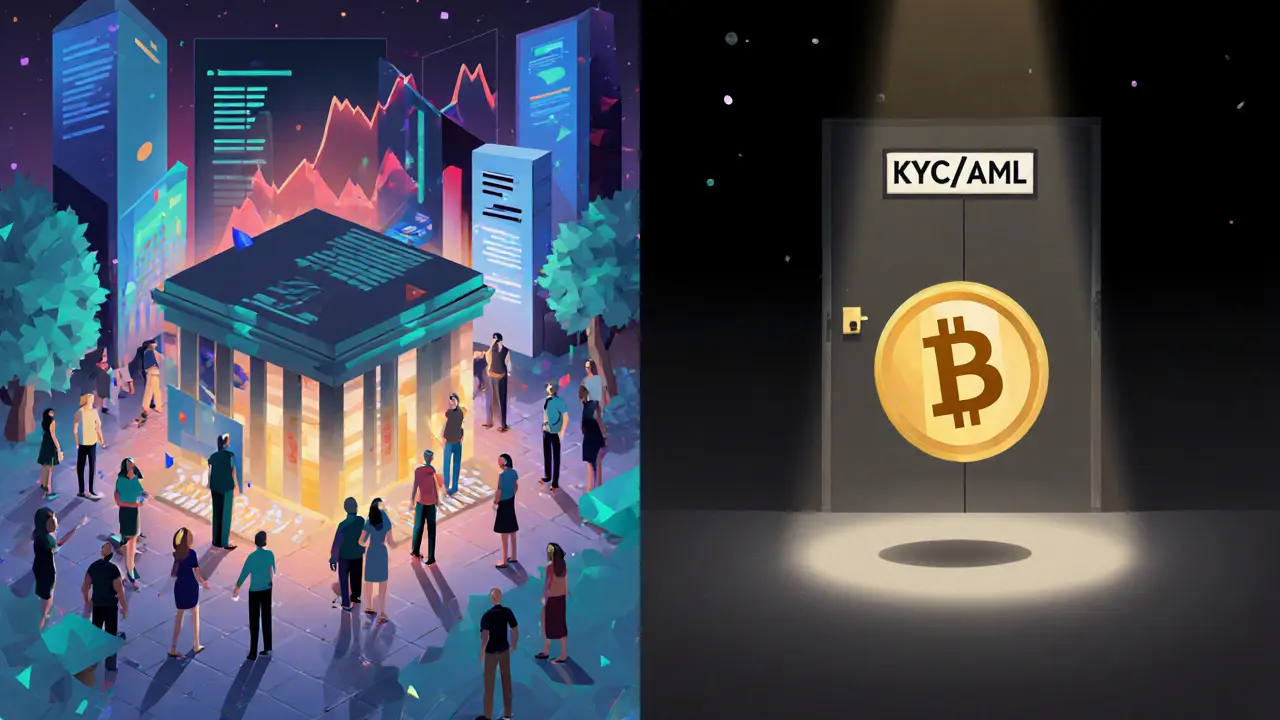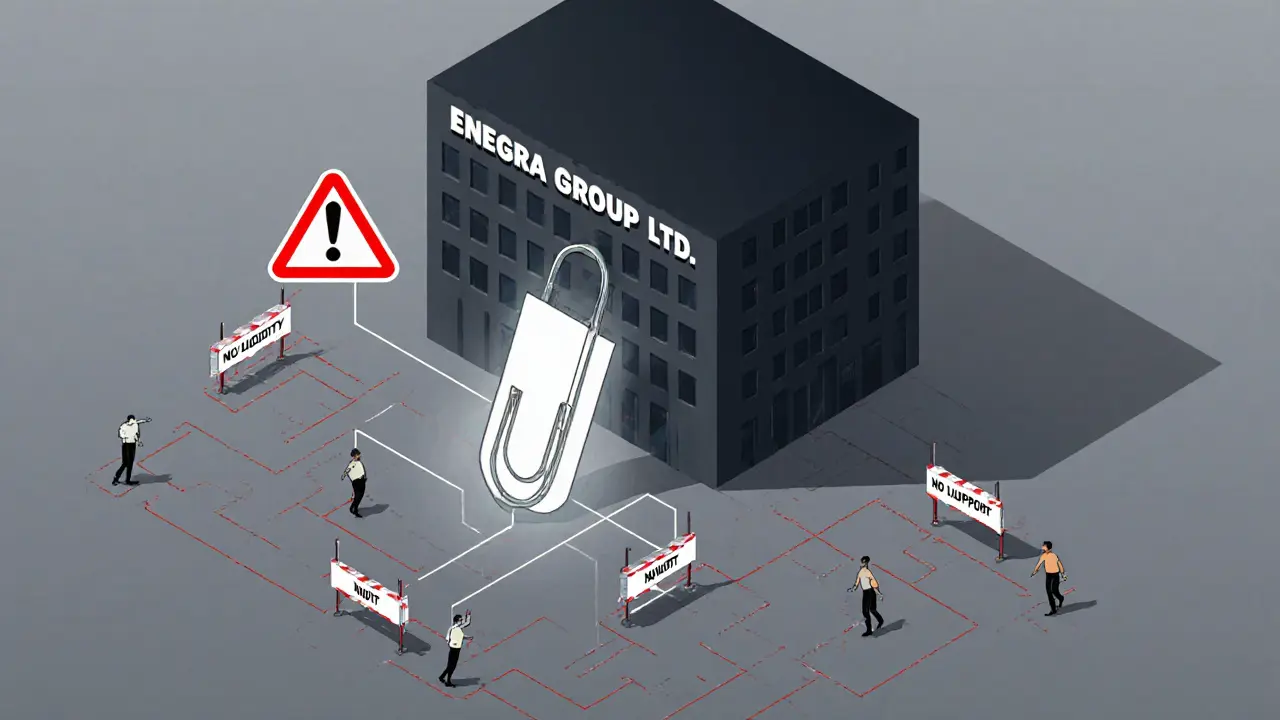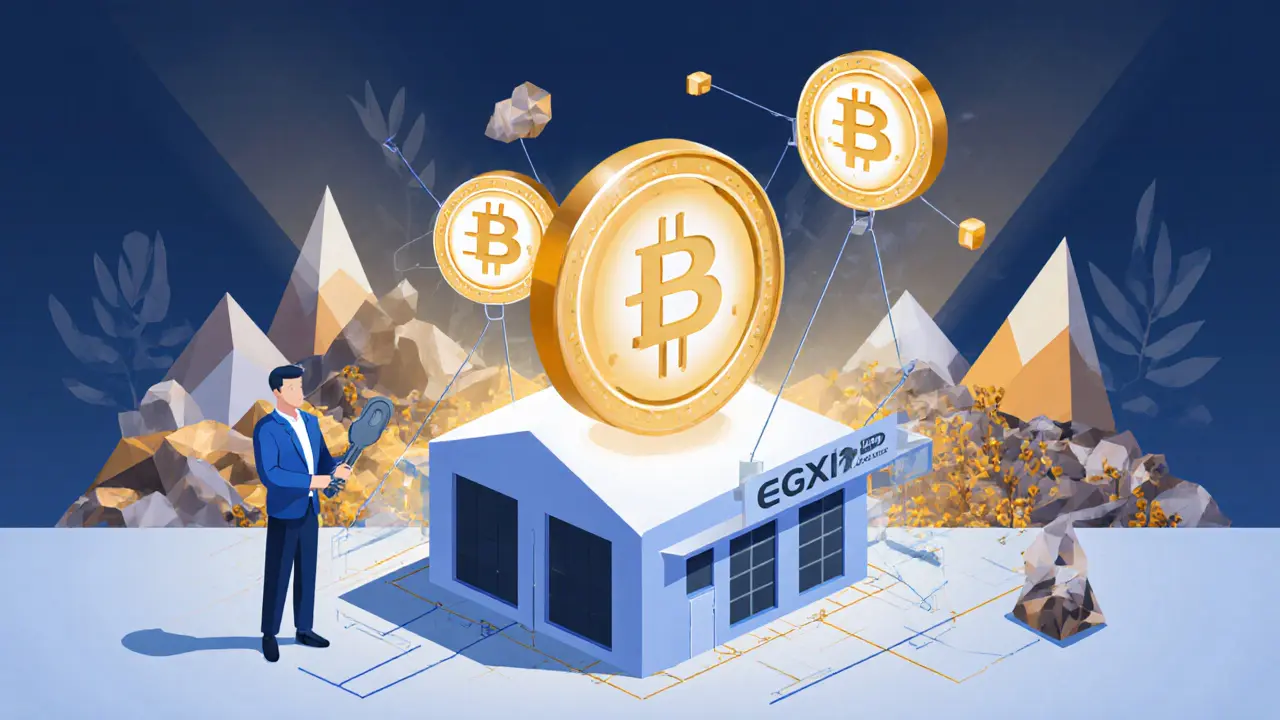EGX Valuation Calculator
Understand EGX Token Value
Enegra (EGX) claims to represent equity in a company with assets valued between $28B and $60B, but trades at $191 per token. This calculator shows the disconnect between the theoretical value and current market price.
Enter values above to see the theoretical valuation.
Enegra (EGX) isn't a typical crypto coin. If you're looking for another meme token or a decentralized app coin, you're looking in the wrong place. EGX is a security token-a digital representation of actual company ownership. Specifically, it represents 100% of the equity in Enegra Group Ltd, a Malaysia-based commodity trading firm founded in 2011. This isn't speculation. It's legally recognized ownership, recorded on a blockchain.
How Enegra (EGX) Works: Ownership on the Blockchain
Think of EGX like a stock, but instead of being held in a brokerage account, it's stored in a crypto wallet. The difference? Every transaction is tracked on the Polygon blockchain, and every holder must pass strict identity checks. This isn't optional. You can't just download a wallet and buy EGX like you would Bitcoin. You need to complete KYC and AML verification through Enegra's system. Your wallet address must be approved before you can even hold the token.
Behind the scenes, a licensed trust company holds the actual shares of Enegra Group Ltd. as nominee. That means if you own EGX tokens, you're not holding shares directly-you're holding a digital claim to those shares. But you still get the rights: dividends, voting power, and a share of profits. The whole setup runs on Tokeny's T-REX platform, which enforces compliance rules automatically. If someone tries to transfer EGX to an unverified wallet, the transaction gets blocked.
This structure follows the ERC-3643 standard, a blockchain protocol built specifically for security tokens. Unlike ERC-20 tokens used by most cryptocurrencies, ERC-3643 includes built-in investor verification. It's not just a tech upgrade-it's a legal requirement. EGX doesn't have a utility like gaming or staking. It doesn't pay gas fees or grant access to a platform. It's pure equity. That makes it a financial instrument, not a cryptocurrency in the traditional sense.
The $33 Billion vs $60 Billion Mystery
Here's where things get confusing. Enegra claims its underlying assets-physical commodities like metals, minerals, and agricultural products-are worth between $28 billion and $60 billion. CoinGecko says $33 billion. CoinMarketCap says $60 billion. Neither source explains how they arrived at these numbers. There's no public audit report, no balance sheet published online, and no third-party verification.
Meanwhile, EGX's market capitalization is practically invisible. Trading volume over 24 hours hovers around $110,000. On CoinDesk, the circulating supply is listed as '-', and CoinMarketCap shows it as '0.00'. That means no one can calculate the token's true market cap. If Enegra is really worth $30+ billion, and EGX represents 100% of that equity, then each token should be worth millions-not $191.
This massive gap between claimed asset value and actual market price raises serious questions. Is the asset valuation inflated? Is the token supply artificially restricted? Or is the market simply ignoring it because it's too hard to trade? No one knows for sure. The lack of transparency is a red flag for any investor.
Where You Can Trade EGX (And Why It's Nearly Impossible)
You won't find EGX on Binance, Coinbase, or Kraken. It trades on only four niche exchanges: P2B, Biconomy.com, BigONE, and one other not widely listed. P2B handles the most volume-about $63,000 in 24 hours. That's less than what a small-cap stock trades in a single hour on the NYSE.
Why such low liquidity? Because EGX is designed for accredited investors, not retail traders. The KYC process takes 3-5 business days. You need to prove your identity, your source of funds, and your investment status. Most people give up after the first step. There's no mobile app. No easy on-ramp. No community forums buzzing with tips. Reddit has only 12 mentions of EGX in the last six months. No YouTube tutorials. No Twitter influencers promoting it.
Even hardware wallets like Ledger and Trezor don't support EGX. You're stuck with software wallets that have been whitelisted by Enegra. And if you lose access to your qualified wallet? Good luck recovering your investment. There's no customer support channel for token holders. Enegra's website talks about commodity trading-not how to manage your EGX.

Who Is EGX Actually For?
EGX isn't for crypto enthusiasts looking to get rich quick. It's for institutional investors or ultra-high-net-worth individuals who want exposure to commodity trading in emerging markets-without buying a private equity stake in a Malaysian company the traditional way.
Enegra's business model is real: they help small miners in Southeast Asia sell their output globally, manage logistics, and reduce exploitation. Tokenizing their equity was meant to give investors easier access to that business. And in theory, it works. The tech is solid. The compliance infrastructure is advanced. The concept aligns with global trends toward tokenized assets.
But in practice? It's a ghost town. The market doesn't believe the asset valuation. The liquidity is non-existent. The barriers to entry are too high. Even if you're accredited and have the capital, you're locked into a system with no exit strategy. Sell your EGX? Good luck finding a buyer. The entire 24-hour trading volume wouldn't cover a single large institutional trade.
Is EGX a Good Investment?
There's no clear answer. The underlying company appears legitimate. The blockchain setup is technically impressive. But investment isn't just about the tech-it's about market trust and liquidity.
Compare EGX to a public stock. Apple trades over $10 billion in a single day. EGX trades $110,000. Apple has millions of shareholders. EGX has... no one knows. No circulating supply means no real ownership distribution. That's not a market. That's a closed ledger.
Also, the price of EGX sometimes moves with the broader crypto market, sometimes against it. That suggests it's being treated as a speculative asset, not a stable equity claim. And if government regulations change-say, if Malaysia tightens security token rules-there's no safety net. No insurance. No recourse.
For now, EGX feels like a solution in search of a problem. The technology works. The legal structure is sound. But without transparency, liquidity, or market confidence, it's just a digital paperclip attached to a billion-dollar company that no one can buy or sell.

What’s Next for Enegra (EGX)?
There’s no roadmap. No team updates. No new features announced. Since its launch in 2019, EGX has been static. No upgrades. No partnerships. No expansion. It’s a snapshot of equity, frozen in time.
Security tokens as a category are growing. PwC predicts the global market could hit $10 trillion by 2030. But EGX isn’t part of that growth. It’s an outlier-a high-value asset trapped in a low-liquidity system. Without independent audits, public disclosures, or exchange listings on major platforms, it won’t attract the attention needed to become meaningful.
Right now, EGX is a curiosity. A fascinating experiment in blockchain equity. But until the numbers add up and the market opens up, it’s not an investment. It’s a riddle wrapped in a blockchain.
Is Enegra (EGX) a cryptocurrency?
No, Enegra (EGX) is not a cryptocurrency. It’s a security token-a digital representation of company equity. Unlike Bitcoin or Ethereum, EGX has no utility, doesn’t power a network, and isn’t mined. It’s a regulated financial asset that gives holders ownership rights in Enegra Group Ltd, similar to owning shares in a public company.
Can I buy Enegra (EGX) on Coinbase or Binance?
No, you cannot buy EGX on Coinbase, Binance, or any major exchange. It’s only available on four niche platforms: P2B, Biconomy.com, BigONE, and one other. Even then, you must complete strict KYC/AML checks through Enegra’s system before your wallet is approved to hold or trade EGX.
Why is the asset value of Enegra so different from its market price?
Enegra claims its underlying commodity assets are worth $28-60 billion, but EGX trades around $191 per token with minimal volume. This huge gap suggests either the asset valuation is inaccurate, the token supply is restricted, or the market doesn’t believe the claims. No public audit or financial statement supports the $30+ billion figure, making the valuation unverifiable.
Do I need to be an accredited investor to buy EGX?
Yes. While not always explicitly labeled as such, the mandatory KYC/AML process, regulatory compliance structure (ERC-3643), and limited exchange access mean EGX is only suitable for accredited or institutional investors. Retail investors face too many barriers-long verification times, no liquidity, and no support-to participate meaningfully.
Can I store EGX in a Ledger or Trezor hardware wallet?
No. EGX does not support standard hardware wallets like Ledger or Trezor. You must use a software wallet that has been individually qualified by Enegra’s compliance system. This means even if you own a hardware wallet, you can’t use it to hold EGX unless Enegra has manually approved your specific wallet address.
Is Enegra (EGX) regulated?
Yes. EGX is a regulated security token under the ERC-3643 standard, designed to comply with financial regulations in Asia and Europe. It’s issued through a licensed trust company and enforces investor verification at every step. This makes it legally distinct from unregulated cryptocurrencies and subject to securities laws.
What happens if Enegra Group Ltd goes bankrupt?
If Enegra Group Ltd goes bankrupt, EGX token holders would be treated as equity shareholders under corporate law. That means they’d be last in line to receive any remaining assets after creditors and bondholders are paid. Since the token represents direct equity, its value would likely drop to zero or near-zero in a liquidation scenario.
Final Thoughts: A Tech Marvel, A Market Failure
Enegra (EGX) proves blockchain can tokenize real-world equity. The legal structure is sound. The compliance tools are advanced. The underlying business has merit. But none of that matters if no one can trade it, no one believes the numbers, and no one knows how many tokens are out there.
For now, EGX is a cautionary tale. Not because the tech failed-but because the market didn’t show up. And in finance, if no one’s buying, it doesn’t matter how good the asset is.

MICHELLE SANTOYO
October 29, 2025 AT 02:29Lena Novikova
October 29, 2025 AT 23:54Anna Mitchell
October 30, 2025 AT 09:40Pranav Shimpi
October 31, 2025 AT 19:23jummy santh
November 2, 2025 AT 14:43Brian Collett
November 2, 2025 AT 23:30Allison Andrews
November 4, 2025 AT 06:16Wayne Overton
November 5, 2025 AT 11:50Alisa Rosner
November 6, 2025 AT 20:00Olav Hans-Ols
November 6, 2025 AT 20:44Kevin Johnston
November 7, 2025 AT 11:28Dr. Monica Ellis-Blied
November 9, 2025 AT 09:21Herbert Ruiz
November 10, 2025 AT 06:53Saurav Deshpande
November 11, 2025 AT 18:26Paul Lyman
November 13, 2025 AT 02:49Frech Patz
November 14, 2025 AT 14:20Derajanique Mckinney
November 15, 2025 AT 20:43Rosanna Gulisano
November 16, 2025 AT 11:04Sheetal Tolambe
November 16, 2025 AT 17:54gurmukh bhambra
November 18, 2025 AT 10:34